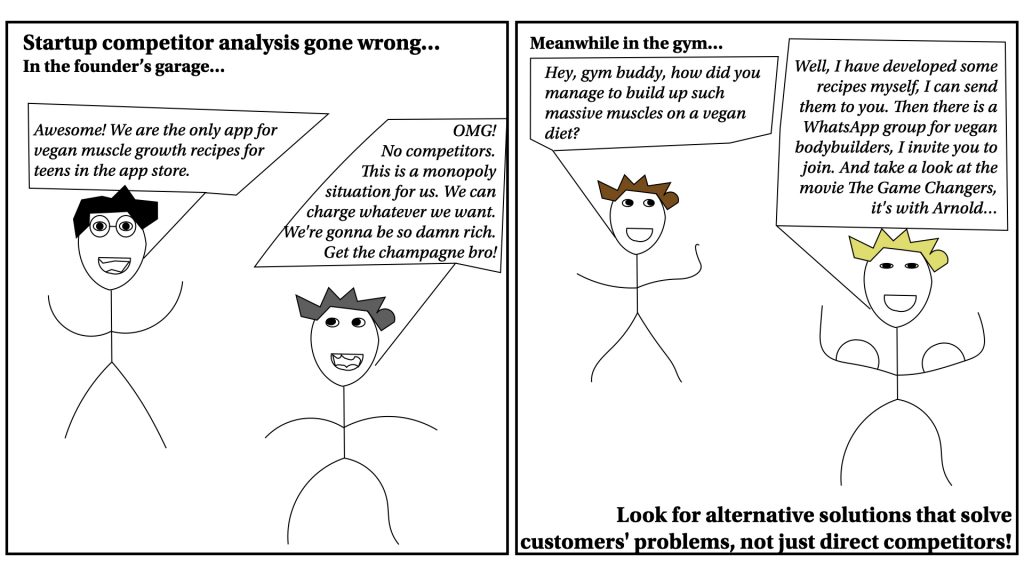A lot has already been said about reasons why startups fail, I don’t want to repeat that. However, I would like to point out a common mistake that I often encounter when coaching startups, which is that founders are too narrow-minded when looking at the competition. On the basis of this misjudgement of the competitive situation, numerous subsequent failures arise.
Here is an example: A start-up team wants to launch a Fair Trade vegetarian protein bar. But who are the competitors?
To answer this question, the founders then list vegetarian Fair Trade protein bars producers, perhaps even come to the conclusion that they have a monopoly because there is no other vegetarian Fair Trade protein bar on the market. But that is WRONG! They have looked at the market too narrowly. This misanalysis often leads to the founders clearly overestimating the market chances of their vegetarian fair-trade protein bar.
But why is this competitive analysis wrong? To answer this question, we have to ask ourselves why the customer buys the product. We therefore try to find out why the customer buys our vegetarian fair-trade protein bar? One reason could be, for example, that the customer hopes for muscle growth due to the higher protein intake. So the customer’s goal is muscle growth through a better protein supply. Competitors are therefore all other alternative solutions who satisfy this goal, not only other vegetarian Fair Trade protein bar suppliers. A fair trade protein shake would also satisfy the customer’s goal. Fair Trade kidney beans? Sure, with 9g protein per 100g an excellent vegetarian protein source. Fair Trade Nuts? Absolutely. All alternative solutions that contribute to the achievement of muscle growth are therefore competitors that need to be differentiated from. In our example we are therefore not in the vegetarian fair trade protein bar market, but in the market for muscle growth. And therefore it is important to consider all relevant alternative solutions in the muscle growth market in a competitive analysis. This could also be illegal methods that promote muscle growth, such as anabolic steroids.

A broader view of the market creates a better understanding of the market situation.Market opportunities are considered more realistically. And it helps to differentiate the vegetarian Fair Trade protein bar from other suppliers who satisfy the same customer needs. Although kidney beans are very rich in protein, they are not recommended as a snack on the way to work. Nuts are good for travelling, but very high in fat. A protein shake can be drunk on the way, but it requires a shaker and milk or water. So compared to these three alternatives, a low-fat, vegetarian protein bar is a good solution for when you are on the go. Now the vegetarian protein bar only has to differentiate itself from the 10,000 other protein bar providers. But that’s another story…
To sum it up: In a competitive analysis, alternative solutions should be considered which also satisfy the same customer needs respectively contribute to the achievement of customer goals. In general, this is about alternative solutions, regardless of whether a competitor offers these solutions in the market, whether they are life hacks or whether they come from other sources. For example, if a company launches a freemium app with muscle growth recipes, the biggest competitors could be experienced training partners who share their muscle growth fitness recipes for free. So look for alternative solutions that solve customers’ problems, not just direct competitors!